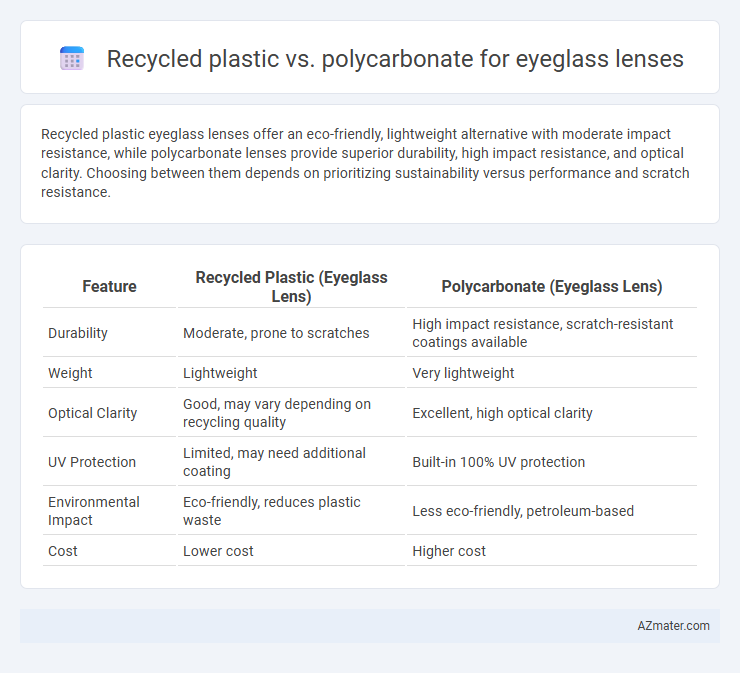Recycled plastic eyeglass lenses offer an eco-friendly, lightweight alternative with moderate impact resistance, while polycarbonate lenses provide superior durability, high impact resistance, and optical clarity. Choosing between them depends on prioritizing sustainability versus performance and scratch resistance.
Table of Comparison
| Feature | Recycled Plastic (Eyeglass Lens) | Polycarbonate (Eyeglass Lens) |
|---|---|---|
| Durability | Moderate, prone to scratches | High impact resistance, scratch-resistant coatings available |
| Weight | Lightweight | Very lightweight |
| Optical Clarity | Good, may vary depending on recycling quality | Excellent, high optical clarity |
| UV Protection | Limited, may need additional coating | Built-in 100% UV protection |
| Environmental Impact | Eco-friendly, reduces plastic waste | Less eco-friendly, petroleum-based |
| Cost | Lower cost | Higher cost |
Introduction: The Rise of Sustainable Eyewear
Recycled plastic eyeglass lenses offer an eco-friendly alternative to traditional polycarbonate lenses by reducing plastic waste and minimizing environmental impact. Polycarbonate lenses, known for their high impact resistance and lightweight properties, dominate the eyewear market but often rely on non-renewable resources. Sustainable eyewear brands increasingly prioritize recycled plastics to balance durability and environmental responsibility in lens manufacturing.
What Are Recycled Plastic Eyeglass Lenses?
Recycled plastic eyeglass lenses are crafted from repurposed plastic materials, offering an eco-friendly alternative to conventional lenses by reducing waste and conserving resources. These lenses maintain optical clarity while promoting sustainability, though they may exhibit slightly lower scratch resistance compared to polycarbonate lenses. Polycarbonate lenses, favored for their high impact resistance and lightweight properties, remain popular for safety and durability despite their higher environmental footprint.
Understanding Polycarbonate Lenses
Polycarbonate lenses are prized for their impact resistance and lightweight properties, making them ideal for eyeglasses requiring durability and comfort. Unlike recycled plastic lenses, polycarbonate offers superior optical clarity and UV protection, enhancing visual performance and eye safety. Their ability to absorb UV rays and resist shattering makes polycarbonate lenses a preferred choice in both prescription eyewear and sports glasses.
Durability Comparison: Recycled Plastic vs Polycarbonate
Polycarbonate lenses offer superior impact resistance, making them significantly more durable than recycled plastic lenses, which are prone to scratches and weakening over time. Recycled plastic lenses may degrade faster under exposure to UV light and physical stress, while polycarbonate maintains clarity and strength longer due to its tougher molecular structure. Choosing polycarbonate ensures higher longevity and better protection against everyday wear and accidental drops in eyeglass lenses.
Optical Clarity and Visual Performance
Polycarbonate lenses offer superior optical clarity with high light transmission and minimal distortion, making them ideal for precise visual performance in eyeglasses. Recycled plastic lenses, while environmentally beneficial, often have lower optical clarity due to impurities and less consistent material quality, which can impact visual sharpness and color accuracy. Opticians recommend polycarbonate for durability and clear vision, especially in high-prescription or safety eyewear.
Weight and Comfort for Daily Wear
Recycled plastic eyeglass lenses offer a lightweight alternative to polycarbonate, enhancing comfort during prolonged daily wear by reducing pressure on the nose and ears. Polycarbonate lenses, while slightly heavier, provide superior impact resistance and durability, making them ideal for active lifestyles. The choice between recycled plastic and polycarbonate largely depends on balancing weight comfort with the need for lens toughness and protection.
Environmental Impact: Production and Recycling
Recycled plastic eyeglass lenses significantly reduce environmental impact by lowering the demand for raw petroleum-based materials and minimizing landfill waste through effective recycling processes. Polycarbonate lenses require energy-intensive production involving toxic chemicals, resulting in a larger carbon footprint and more challenging recycling due to chemical additives and composite layers. Choosing recycled plastic materials supports circular economy principles by promoting resource efficiency and reducing greenhouse gas emissions across the entire lifecycle of the lenses.
Cost Analysis: Affordability and Value
Recycled plastic eyeglass lenses offer significant cost savings due to lower manufacturing expenses and the use of sustainable materials, making them an affordable choice for budget-conscious consumers. Polycarbonate lenses, while generally more expensive, provide higher impact resistance and durability, delivering greater long-term value despite the initial investment. Comparing cost effectiveness, recycled plastic lenses prioritize affordability with environmental benefits, whereas polycarbonate lenses balance cost with enhanced performance and longevity.
Safety and Scratch Resistance
Recycled plastic eyeglass lenses offer enhanced environmental benefits but generally have lower scratch resistance compared to polycarbonate lenses, which provide superior durability and impact resistance, making them safer for everyday use. Polycarbonate lenses are inherently shatter-resistant, reducing the risk of eye injury during accidents, while recycled plastic lenses may compromise on toughness due to material impurities. For users prioritizing safety and long-term clarity, polycarbonate remains the preferred choice, especially in settings requiring high impact protection and scratch resilience.
Which Lens Material Is Best for You?
Recycled plastic eyeglass lenses offer an eco-friendly alternative with lightweight comfort and decent impact resistance, making them ideal for environmentally conscious wearers on a budget. Polycarbonate lenses provide superior durability, impact resistance, and built-in UV protection, best suited for active lifestyles or those requiring high safety standards. Choosing between recycled plastic and polycarbonate lenses depends on balancing environmental priorities, durability needs, and cost considerations to find the best fit for your vision and lifestyle.

Infographic: Recycled plastic vs Polycarbonate for Eyeglass lens
 azmater.com
azmater.com